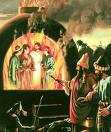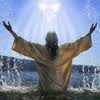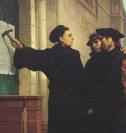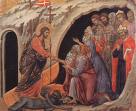
Brothers :
The Holy Spirit
and Jesus
| Next | Previous | Index | Tellout Home |
3. Father, Son, and Spirit
Pre-incarnate Form
God said in Genesis 1.26, "Let us make mankind in our image, in our likeness, so that they may rule fish in the sea, birds in the sky, livestock, all the wild animals, and all the creatures that move along the ground." The words "in our image" and "in our likeness" are in the plural form, indicating the Trinity of Father, Son, and Holy Spirit. Professor of Religion Mark Silk, at Trinity College, Hartford, Connecticut in "Spiritual Politics," explains that the ancient Hebrew word for God is "Elohim" which is a plural form of God's actual name. It is distinct from the singular form in Hebrew as "Yahweh" or "Jehovah" generally translated into English as "Lord." We could therefore translate Exodus 15.2 as, "The Lord (Yahweh) is my strength and my song, they have become my salvation. They are my God, and I will praise them, my Father's God, and I will exalt them." This possibility is another indication of the three-in-one God. ✞
Let Us Surprise
I am always amazed to read "let us," suggesting several persons in the Godhead or possibly multiple voices in a council of God in Genesis 1.26, "Then God said, 'Let us make mankind in our image, in our likeness, so that they may rule over the fish in the sea and the birds in the sky, over the livestock and all the wild animals, and over all the creatures that move along the ground.'" Astoundingly, the phrase "Let us" in Genesis 1.26 survived despite more than two thousand years of scribal copying. Jewish people are strict deists who can not countenance any other god than the one Holy God of Israel. Despite this, they faithfully preserved a clear signal of the Godhead's plurality, indicating three persons in the Trinity of God the Father, God the Son, and God the Holy Spirit. The "wild animals" in this reading can be understood in the original Hebrew text as "the earth," indicating every living creature in the land. ✞
Old Testament Trinity
 In the Old Testament, in Daniel 3.25, we also see Jesus appearing and disappearing in different places. After a pagan king had thrown Daniel and his two friends into the furnace of fire, he approached the door and peeked in through the roaring heat. What this pagan king then said rocks us on our heels, "Look! I see four men walking around in the fire, unbound and unharmed, and the fourth looks like a son of the gods." Even a pagan king recognizes that God, or "a god," or "a son of the gods," is with these three brave Jewish individuals. The "son of the gods" with Daniel and his two friends probably refers to Jesus in a pre-incarnate form! Other Old Testament examples describe a "God figure," possibly the son of God himself, talking to Abraham and later wrestling with Jacob. ✞
In the Old Testament, in Daniel 3.25, we also see Jesus appearing and disappearing in different places. After a pagan king had thrown Daniel and his two friends into the furnace of fire, he approached the door and peeked in through the roaring heat. What this pagan king then said rocks us on our heels, "Look! I see four men walking around in the fire, unbound and unharmed, and the fourth looks like a son of the gods." Even a pagan king recognizes that God, or "a god," or "a son of the gods," is with these three brave Jewish individuals. The "son of the gods" with Daniel and his two friends probably refers to Jesus in a pre-incarnate form! Other Old Testament examples describe a "God figure," possibly the son of God himself, talking to Abraham and later wrestling with Jacob. ✞
Trinity Spirit
 In the Gospels, we discover the Holy Spirit in the Trinity at the Baptism of Jesus. We see the Son of God, alongside the Heavenly Father, who speaks his approval of Jesus from Heaven and the Holy Spirit hovering like a dove. The Father declares from the clouds, "This is my beloved Son," and the Spirit hovered over Jesus like a dove. Here we have all three members of the Holy Trinity at once. Jesus, the son, was being baptized, the Father's voice announced who he was from heaven, and the Spirit descended upon Jesus like a dove. ✞
In the Gospels, we discover the Holy Spirit in the Trinity at the Baptism of Jesus. We see the Son of God, alongside the Heavenly Father, who speaks his approval of Jesus from Heaven and the Holy Spirit hovering like a dove. The Father declares from the clouds, "This is my beloved Son," and the Spirit hovered over Jesus like a dove. Here we have all three members of the Holy Trinity at once. Jesus, the son, was being baptized, the Father's voice announced who he was from heaven, and the Spirit descended upon Jesus like a dove. ✞
Trinity Roles
Jesus later talked about his close relationship with both the Father and Spirit. He said after his resurrection in John 20.17, " 'Do not hold on to me, for I have not yet ascended to the Father. Go instead to my brothers and tell them that I am ascending to my Father, and your Father, my God, and your God." Note here how Jesus regarded his relationship with his Father in heaven as different from his disciples' relationship with their Father in Heaven. Jesus had earlier talked about the roles of the Father, Son, and Spirit in John 15.26 "When the Advocate comes, whom I will send to you from the Father — the Spirit of truth who goes out from the Father — he will testify about me." ✞
Heavenly Father
 As Jesus ascends to heaven, he commissions his disciples. Jesus uses the powerful words in Matthew 28.19-20a, "Therefore go and make disciples of all nations, baptizing them in the name of the Father and of the Son and the Holy Spirit, and teaching them to obey everything I have commanded you." This verse is critical in determining that baptism is performed not in Jesus' name alone but the three Trinity persons' names, the Father, Son, and Spirit. Jesus' final instruction to the Apostles at the Ascension contains the Father, Son, and Spirit. ✞
As Jesus ascends to heaven, he commissions his disciples. Jesus uses the powerful words in Matthew 28.19-20a, "Therefore go and make disciples of all nations, baptizing them in the name of the Father and of the Son and the Holy Spirit, and teaching them to obey everything I have commanded you." This verse is critical in determining that baptism is performed not in Jesus' name alone but the three Trinity persons' names, the Father, Son, and Spirit. Jesus' final instruction to the Apostles at the Ascension contains the Father, Son, and Spirit. ✞
Three Fold Name
Luke writes in Acts 1.7-8, "Jesus said to them: 'It is not for you to know the times or dates the Father has set by his authority. But you will receive power when the Holy Spirit comes on you, and you will be my witnesses in Jerusalem, and all Judea and Samaria, and to the ends of the earth.'" Later, Saint Paul blesses the Corinthian Christians with the threefold name of the Father, Son, and Spirit in 2 Corinthians 13.14, "May the grace of our Lord Jesus Christ, and the love of God, the Father, and the fellowship of the Holy Spirit be with you all." ✞
Creation Redemption Sanctification
 In the threefold expression of the Holy Trinity, Jesus is one of three persons, thus Father, Son, and Spirit. Martin Luther, during the Reformation, stated that Jesus, as God was an essential belief. He examined the work of the three members of the Holy Trinity in his own life in his book, "Sermons on the Catechism." He wrote pointedly, "Therefore, from the Father I receive creation, from the Son redemption, from the Holy Spirit sanctification." Jesus had a prominent and essential place in the church. ✞
In the threefold expression of the Holy Trinity, Jesus is one of three persons, thus Father, Son, and Spirit. Martin Luther, during the Reformation, stated that Jesus, as God was an essential belief. He examined the work of the three members of the Holy Trinity in his own life in his book, "Sermons on the Catechism." He wrote pointedly, "Therefore, from the Father I receive creation, from the Son redemption, from the Holy Spirit sanctification." Jesus had a prominent and essential place in the church. ✞
Jesus is Lord
The first creed used by the Early Church was probably "Jesus is Lord." We find this in Romans 10.9, where Saint Paul writes, "If you declare with your mouth, 'Jesus is Lord,' and believe in your heart that God raised him from the dead, God will save you." The Apostles' Creed gives us a further statement of belief, as does the Nicene Creed, written around 325 AD after the Council of Nicaea. From these creeds and others like the Athanasius Creed in the same period come a uniform Christian doctrine. Church leaders across Europe and North Africa formulated and agreed upon the Creeds to counter certain sects that argued against the Holy Trinity's existence and other basic tenets of the Christian faith. ✞
Holy
 Jesus himself defended his deity at his trial in John 10.36b when he said, "Why then do you accuse me of blasphemy because I said, 'I am God's Son?'" These passages, like John 10.30, which reads, "The Father and I are one," clearly show that the Jewish leaders accused Jesus because he claimed to be part of the deity and that he was God himself. Some modern and often very aggressive sects like Jehovah's Witnesses and the Church of the Latter-Day Saints (Mormons) deny the existence of Jesus in the Holy Trinity. They say that Jesus is not truly God, but that God only gives Jesus some unique powers as a chosen human being. They also contend that the Holy Spirit is merely a force from God and not God himself. They argue that the Father is another name for the One and only God. ✞
Jesus himself defended his deity at his trial in John 10.36b when he said, "Why then do you accuse me of blasphemy because I said, 'I am God's Son?'" These passages, like John 10.30, which reads, "The Father and I are one," clearly show that the Jewish leaders accused Jesus because he claimed to be part of the deity and that he was God himself. Some modern and often very aggressive sects like Jehovah's Witnesses and the Church of the Latter-Day Saints (Mormons) deny the existence of Jesus in the Holy Trinity. They say that Jesus is not truly God, but that God only gives Jesus some unique powers as a chosen human being. They also contend that the Holy Spirit is merely a force from God and not God himself. They argue that the Father is another name for the One and only God. ✞
Heretical Sects
To belong to a faithful Christian church, a belief in the Father, Son, and Spirit is essential. From the earliest times, other views were called unorthodox and heretical by the church at large. Those who do not believe in the Trinity are considered sects and not legitimate denominations by the World Council of Churches, founded in 1948. Its mission statement states it to be a "fellowship of churches which confess the Lord Jesus Christ as God and Savior according to the Scriptures and therefore seek to fulfill together their common calling to the glory of the one God: Father, Son, and Holy Spirit." All churches regard belief in the Apostles' and Nicene Creeds as necessary and the true mark of genuine Christianity. That is why the World Council of Churches excludes both the Mormons and Jehovah's Witnesses and other similar sects. ✞
Holy Trinity Love
 The Holy Trinity's love of the Father, Jesus, and Spirit bind all three members together as almighty, immortal, and invisible. Holy Trinity love needs to become incorporated into our Christian lives and not just as cold theology. We need a warm, loving relationship with all three persons of the Trinity. Once Bishop of Bath and Wells in England, Thomas Ken (1637-1711) offered a poem praising the Holy Trinity. "Praise and honor, thanksgiving and praise more than we can utter be unto thee, O most adorable Trinity, Father, Son, and Holy Ghost, by all angels, all men, all creatures forever and ever Amen and Amen. To God the Father, who first loved us, and made us accepted in the Beloved; To God the Son who loved us, and washed us from our sins in his blood; To God the Holy Ghost, who sheds the love of God abroad in our hearts be all love and all glory for time and eternity. Amen." The love of the Father, Son, and Spirit as the most adorable Trinity saturates this prayer. ✞
The Holy Trinity's love of the Father, Jesus, and Spirit bind all three members together as almighty, immortal, and invisible. Holy Trinity love needs to become incorporated into our Christian lives and not just as cold theology. We need a warm, loving relationship with all three persons of the Trinity. Once Bishop of Bath and Wells in England, Thomas Ken (1637-1711) offered a poem praising the Holy Trinity. "Praise and honor, thanksgiving and praise more than we can utter be unto thee, O most adorable Trinity, Father, Son, and Holy Ghost, by all angels, all men, all creatures forever and ever Amen and Amen. To God the Father, who first loved us, and made us accepted in the Beloved; To God the Son who loved us, and washed us from our sins in his blood; To God the Holy Ghost, who sheds the love of God abroad in our hearts be all love and all glory for time and eternity. Amen." The love of the Father, Son, and Spirit as the most adorable Trinity saturates this prayer. ✞
Most Adorable
 Archbishop John Dowden (1840-1910) became Bishop of Edinburgh in Scotland in 1886. He, too, responded with a prayer for the Holy Trinity's love. "O Lord God, almighty, immortal, invisible, the mysteries of whose being are unsearchable. Accept, we beseech thee, our praises for the revelation which thou hast made of thyself. Father, Son, and Spirit, three persons, and one God. And mercifully grant that, ever holding fast this faith, we may magnify thy glorious name. Who lives and reigns, one God, world without end. Amen." ✞
Archbishop John Dowden (1840-1910) became Bishop of Edinburgh in Scotland in 1886. He, too, responded with a prayer for the Holy Trinity's love. "O Lord God, almighty, immortal, invisible, the mysteries of whose being are unsearchable. Accept, we beseech thee, our praises for the revelation which thou hast made of thyself. Father, Son, and Spirit, three persons, and one God. And mercifully grant that, ever holding fast this faith, we may magnify thy glorious name. Who lives and reigns, one God, world without end. Amen." ✞
"Father Son and Spirit"
by Ron Meacock © 2021
| Top Page | Next | Previous |